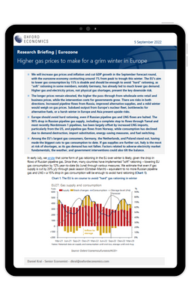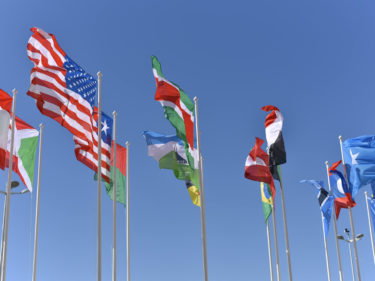Higher gas prices to make for a grim winter in Europe
 We will increase gas prices and inflation and cut GDP growth in the September forecast round, with the eurozone economy contracting around 1% from peak to trough this winter. The EU’s aim to lower gas consumption by 15% is doable and should be enough to avoid “hard” rationing, as “soft” rationing in some members, notably Germany, has already led to much lower gas demand. Higher gas and electricity prices, not physical gas shortages, present the key downside risk.
We will increase gas prices and inflation and cut GDP growth in the September forecast round, with the eurozone economy contracting around 1% from peak to trough this winter. The EU’s aim to lower gas consumption by 15% is doable and should be enough to avoid “hard” rationing, as “soft” rationing in some members, notably Germany, has already led to much lower gas demand. Higher gas and electricity prices, not physical gas shortages, present the key downside risk.
What you will learn:
- The longer prices remain elevated, the higher the pass-through from wholesale onto retail and business prices, while the intervention costs for governments grow.
- There are risks in both directions. Increased pipeline flows from Russia, improved alternative supplies, and a mild winter would weigh on gas prices.
- Subdued output from Europe’s nuclear fleet, bottlenecks for alternative fuels, or a harsh winter in Europe and Asia present upside risks.
Tags:
Related services

Service
European Macro Service
A complete service to help executives track, analyse and react to macro events and future trends for the European region.
Find Out More

Service
Global Economic Model
Our Global Economic Model provides a rigorous and consistent structure for forecasting and testing scenarios.
Find Out More